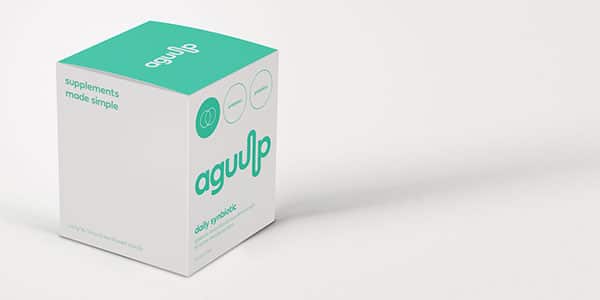
What Are Synbiotics? Everything You Need to Know

You will have heard of probiotics and prebiotics, but have you heard of synbiotics? Put simply, synbiotics are a mixture of probiotics and prebiotics that when combined, have a synergistic beneficial effect on the gut microbiome. By taking them together in synbiotic form, you’re essentially repopulating your gut with good bacteria while providing that bacteria with the nutrients it needs to work properly.
Read on to discover everything you need to know about the benefits of taking synbiotics, and find out how to identify the best synbiotic supplements available.
What is in synbiotics?
Synbiotics contain both probiotics and prebiotics.
- Probiotics are beneficial strains of live bacteria that the gut needs for optimal health
- Prebiotics are the plant fibres that the probiotics (bacteria) need to survive and thrive
Read more about the difference between prebiotics and probiotics.
What are the benefits of synbiotics?
Studies have shown that taking a synbiotic can be an effective treatment for IBS, and for many other digestive issues. Synbiotics can also be beneficial for people who have been on antibiotics, which unfortunately wipe out a significant number of friendly bacteria while trying to eliminate the pathogenic stains.
Making sure that your gut microbiome is receiving a balance of both probiotics and prebiotics can help to support a healthy gut, and taking a synbiotic supplement like our aguulp Gut Probiotic formula is an easy way to do this.
How to find the best synbiotic supplements
Knowing what to look for in a gut health formula is important if you want to make sure you’re taking the best synbiotic supplements available. We recommend looking for:
CFUs
There must be a viable number of bacteria in each dose of Synbiotic, the bacteria is measured in colony-forming units or CFUs.
Our Gut Probiotic daily synbiotic formula contains 50 billion live bacteria (CFUs). This is a high dose appropriate for significantly impacting a troubled gut, as opposed to simply offering light support (where 10-20 CFU might suffice).
Different species and strains of probiotics
We recommend aiming for a varied combination of probiotics in any synbiotics you take. The most commonly used species are Bifidobacteria and Lactobacillus.
Bifidobacteria help support the immune system, limit growth of pathogenic bacteria and break down lactose into nutrients the body needs
Lactobacillus helps limit the growth of pathogenic bacteria and produces lactic acid which serves as fuel for muscles and increases the absorption of minerals
Our aguulp Gut Probiotic synbiotic formula contains Bifidobacteria, Lactobacillus, and streptococcus – the latter is known for its ability to break down food, absorb nutrients, and provide support to the immune system.
Most synbiotics on the gut health market typically contain 5-6 different probiotic strains, but ours contains 10 to support your gut microbiome even further.
Prebiotics
Synbiotics also contain prebiotics – the ‘food’ for the probiotic live bacteria. Our Gut Probiotic contains FOS, XOS, and inulin, which have all been shown to positively impact the good bacteria in the gut and contribute to normal bowel function.
Look out for all of these ingredients when you’re shopping for gut health products to make sure you’re getting the best synbiotic supplements possible.
How long should you take synbiotics for?
There’s no one-size-fits-all answer to how long you should take synbiotic for, as everybody is different and some people may find that they feel a beneficial effect within the first few weeks. However, it’s been recommended by the British Society of Gastroenterology that optimal results will most likely be achieved after 12 weeks of use.
After the course of 12 weeks, most people should find that their gut health is in a more balanced state, at which point they could discontinue the use of synbiotics and instead focus on maintaining a happy gut through diet, lifestyle, and supplementing prebiotics on their own.
This may not be the case for everybody though, and some people with severe digestive issues may find it beneficial to take a synbiotic on an ongoing basis, or every few months as a ‘reboot’ precaution.
Can I take synbiotics with other gut health supplements?
Yes you can! Taking synbiotics alongside another gut health supplement like aguulp for Gut can be a great way to boost your existing supplement routine, but it’s not a necessity. Both aguulp for Gut and our aguulp Gut Probiotic can be taken alongside each other and even mixed together as a drink just before consumption.
Both supplements support the gut in different ways, which means they can be taken independently of each other and still do a great job – when combined, they can create even better results!
You can think of aguulp for Gut as the housekeeper: it contains vitamin D, marine collagen, and zinc to support the gut’s lining and inflammatory response, while providing the food (prebiotics fibres) that encourage your good gut bacteria to grow. This helps to create a nice home environment for the live probiotics in our synbiotic formula to thrive, survive, and do their job.
If you have any further questions about synbiotics, we’re here to help – simply drop us an email at [email protected] or talk to us on live chat. Browse our full collection of gut health supplements today.
Sources:
https://www.health.harvard.edu/staying-healthy/should-you-take-probiotics
https://www.healthline.com/nutrition/best-probiotic-supplement#how-to-choose
https://www.healthline.com/health/types-of-probiotics#common-probiotics
https://www.webmd.com/vitamins/ai/ingredientmono-1621/streptococcus-thermophilus
https://www.sciencedirect.com/topics/immunology-and-microbiology/synbiotics
